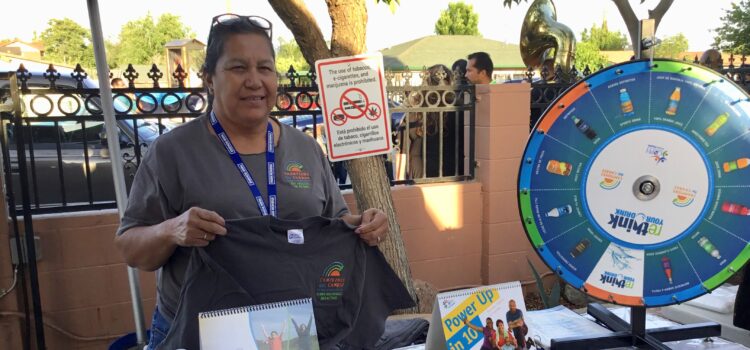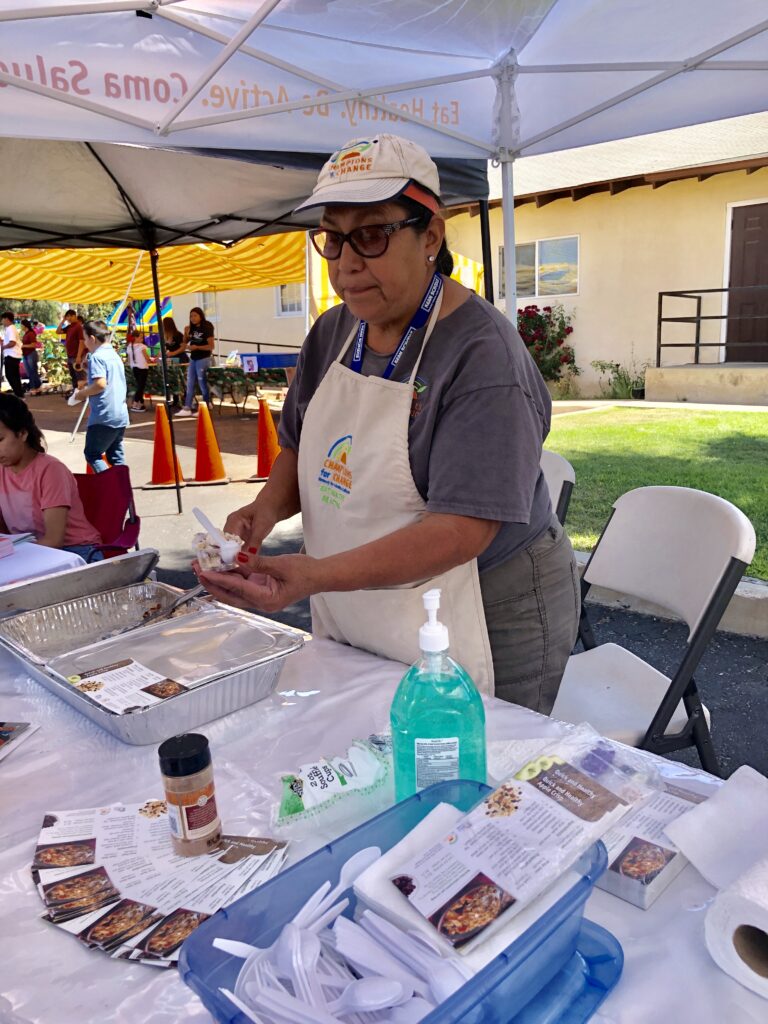
Before Laura Salgado moved to Bakersfield in 1996, she had been teaching at an elementary school in Mexicali for 16 years. Though she didn’t come back to an elementary school classroom in Bakersfield, she still found a way to educate those around her.
Salgado, 57, found herself in a new leadership role in a community of Spanish-speaking immigrants like her. She is a promotora.
“I love my work because I enjoy that each day there’s a new story,” Salgado said. “Above all, each day I can share what I learn, especially to help my community.”
As a regional coordinator in Kern County with Vision y Compromiso, an organization that supports and trains more than 4,000 promotores and community health workers in California and Nevada, she has gone into communities throughout the Central Valley educating people on a variety of health issues, such as diabetes and sex education, through different types of outreach efforts, including nutrition and dance therapy classes.
“Laura is a perfect example of what a natural leader is,” said Hugo Ramirez, the director of programs for Vision y Compromiso. “She’s an immigrant whose passion helps her community.”
Salgado, like almost all promotores, doesn’t have traditional credentials, but being a promotora isn’t about degrees and credentials. Promotores are lay members embedded in the community who educate from within the community but also advocate on behalf of its needs.
“A promotor is a natural leader that members of their own community gravitate to for resources,” said Ramirez.
Though promotores aren’t credentialed, that isn’t to say Salgado or others are untrained or unskilled. Promotores bring leadership skills, community connections and passion to the table. They receive training, too. It could come from public health departments, hospitals or clinics or other organizations looking to improve health outcomes, such as Visión y Compromiso.
Salgado first got involved with Vision y Compromiso in 2013. Her first big project was called Families Talking Together. Promotoras reached out to the parents in communities with high teen pregnancy rates. Their goal was to reduce pregnancies and sexually transmitted diseases. Promotoras reached out to parents in beauty salons, farmers markets and community events.
Visión y Compromiso likes to says promotores provide “servicio de corazón” or service from the heart. Many promotores go unpaid for their work, simply because they want to serve their communities.
Salgado’s work as a promotora has taken her to churches in Arvin and Bakersfield, food banks in Lamont, low-income senior housing and to the state capitol to do advocacy work.
In a small classroom at St. Thomas in Arvin, Salgado teaches what she calls a nutrition class, which promotes a healthy lifestyle through diet and exercise.
At these meetings, she goes over exercise routines with the group, offers resources and tips for a healthy lifestyle and even gives healthy cooking recipes, such as the meal the group prepared for lunch: a torta made with lean chicken breast and spiced with jalapeños and pico de gallo. Her nutrition tips included one any Californian would appreciate — substitute in avocado for mayo on your sandwiches to add a bit of heart-healthy creaminess.
Elizabeth Esquivas and Rosa Calderon are sisters who decided to take the class together when they heard about it in church. Calderon said she worries about her 17-year-old son with high cholesterol, and Esquivas worries about her kids spending too much time playing Xbox.
“(The class) gives us ideas about what to do,” Esquivas said.

Salgado has also spent mornings in a booth on behalf of Champions for Change during a church celebration at San Clemente in Bakersfield. She enticed churchgoers with samples of an apple crisp that could be made in five minutes, along with a recipe card.
“It’s very delicious,” she called out, while handing out the cups.
She talked with church goers about what made the treat healthy and offered a few strategies they could use to reduce added sugar in their diets and prevent diabetes.
Salgado has also worked with seniors in an affordable housing complex, Casa de Eva. For years, Salgado meets with a group with elders to do what is called bailoterapia. The practice was created by promotores, and it translates to dance therapy.
During the therapy session, Salgado brings tennis balls and stretching bands for everyone and leads the class through a routine of stretching, lifting and some light strength work.
Participants have told Salgado her sessions have helped alleviate different ailments. Alberto Perea said the class has helped him with cirrhosis, diabetes, cholesterol and a disc that bothers him in his back.
Salgado also includes inspirational messages and bible verses in her class.
Maria Elena Mayorquin, who has been attending classes since 2015, said the discussion time is her favorite part of the class.
“We talk about the Bible, and then we all get to say something,” she said.
Bailoterapia is not just about addressing the physical health of the community but also its social and spiritual health, said Nataly Santamaria, Kern County Promotora Network Manager.
“The goal is to create community as well,” Santamaria said.
Salgado says that in some ways she feels like she’s always been a promotora, even back in Mexicali when she was teaching.
She said, “I believe that I was already a promotora before because I always enjoyed helping and sharing with others.”
South Kern Sol is a youth-led journalism organization in Kern County. In their stories, youth reporters shine light on health and racial disparities in under-served communities across Kern. For more stories by South Kern Sol, head to southkernsol.org.